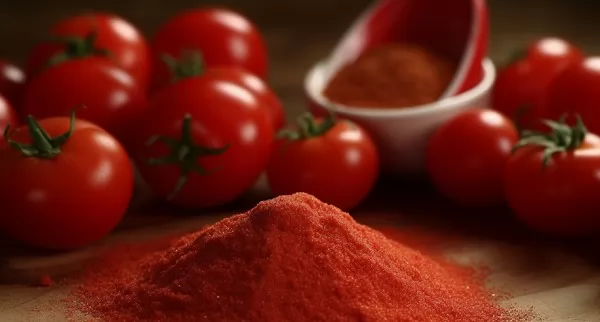- 0086-571-85302990
- sales@greenskybio.com
lycopene molecular weight
2023-08-21

Introduction to Lycopene
Lycopene, also known as Lycopene, is a natural carotenoid and plant pigment, mainly found in red fruits and vegetables, especially tomato . This powerful antioxidant has many known health benefits and can help protect against many diseases, including certain types of cancer.

chemical properties
Lycopene is a non-polarizing, water-insoluble molecule. It is a linear, unbranched carotenoid consisting of 40 carbon atoms.

Molecular mass
The molecular formula of lycopene is C40H56. Based on the relative atomic mass of each element, we can calculate the molecular mass of lycopene. The relative atomic mass of carbon (C) is about 12.01, so the total mass of 40 carbon atoms is: 40 x 12.01 = 480.4 The relative atomic mass of hydrogen (H) is about 1.01, so the total mass of 56 hydrogen atoms is: 56 x 1.01 = 56.56 Adding these two values, we get: 480.4 + 56.56 = 536.96 Therefore, the molecular mass of lycopene is about 536.96 g/mol.


Application and health benefits
Lycopene, a powerful antioxidant, is widely used in the health food, cosmetic and pharmaceutical industries. Its antioxidant properties help the body fight free radicals that damage cells, thereby preventing many diseases. In addition, studies have shown that getting enough lycopene can help reduce the risk of certain types of cancer, cardiovascular disease, and degenerative eye disease. If you are interested inMore information on lycopeneor other related products Interested, pleaseContact Usor visit our span>Product Page for more details.

Source of lycopene
The main sources of lycopene are red fruits and vegetables, especially tomatoes. But it's also found in persimmons, tomatoes, red peppers, watermelon, citrus fruits, and papayas. The content of lycopene in different foods will vary, with tomatoes and persimmons being the richest sources. It is worth noting that the body absorbs lycopene better by consuming heated tomato products, such as tomato paste or tomato juice. This is because the heating process can help release more lycopene and make it easier for the body to absorb.
The benefits of taking lycopene
Antioxidant properties: Lycopene is a powerful antioxidant that neutralizes free radicals in the body, thereby helping to prevent oxidative stress caused by harm. Cancer prevention: Numerous studies have shown that regular intake of lycopene can help reduce the risk of certain cancers, especially prostate cancer. Cardiovascular Health: Lycopene helps lower bad cholesterol and enhance cardiovascular health. Skin Health: Thanks to its antioxidant properties, lycopene protects the skin from UV rays and pollution, thereby preventing skin aging. Improves vision: Lycopene has beneficial effects on eye health and can prevent certain degenerative eye diseases, such as cataracts.
Lycopene supplement
In addition to taking lycopene through food, you can also consider usingLycopene Supplement. Lycopene in supplement form provides higher doses and is more easily absorbed by the body. However, it is best to consult a doctor or nutritional professional before beginning any supplementation program. When choosing a lycopene product, make sure to chooseReputable Supplier, ensuring the quality and purity of its products. Hope the above information will help you to better understand lycopene and its molecular mass. If you have any other questions or need further information, please feel free toContact us.
TAGS:- ▶ Hesperidin
- ▶ citrus bioflavonoids
- ▶ plant extract
- ▶ lycopene
- ▶ Diosmin
- ▶ Grape seed extract
- ▶ Sea buckthorn Juice Powder
- ▶ Beetroot powder
- ▶ Hops Extract
- ▶ Artichoke Extract
- ▶ Reishi mushroom extract
- ▶ Astaxanthin
- ▶ Green Tea Extract
- ▶ Curcumin Extract
- ▶ Horse Chestnut Extract
- ▶ Other Problems
- ▶ Boswellia Serrata Extract
- ▶ Resveratrol Extract
- ▶ Marigold Extract
- ▶ Grape Leaf Extract
- ▶ blog3
-
High purity olive leaf extract
2023-08-21
-
Lavender oil extraction method
2023-08-21
-
100% organic virgin sea buckthorn fruit oil
2023-08-21
-
Lotus leaf extract powder factory in China
2023-08-21
-
China aged garlic extract supplier
2023-08-21
-
Deer antler extract powder manufacturer
2023-08-21
-
Saw palmetto extract vs whole herb
2023-08-21
-
Troxerutin
2023-08-21
-
Hops Extract
2023-08-21
-
Reishi mushroom extract
2023-08-21
-
Cocoa Extract
2023-08-21
-
Acai Berry Extract
2023-08-21
-
Pueraria Lobata Extract
2023-08-21
-
Kelp Extract Powder
2023-08-21
-
Polygonum Cuspidatum Extract
2023-08-21
-
Curcumin
2023-08-21
-
Soy Extract
2023-08-21





















